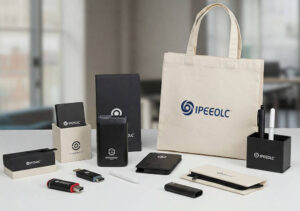Corporate gifting is an essential aspect of modern business practices that encompasses the thoughtful selection and presentation of gifts to enhance relationships with clients, employees, and partners. The significance of corporate gifting transcends mere transactional interactions; it plays a crucial role in building trust, encouraging loyalty, and fostering a positive organizational culture. In the competitive landscape of business, the act of giving gifts can serve as a strategic tool to express appreciation and recognition, contributing to stronger professional bonds.
The cultural values associated with corporate gifting vary across different regions and industries, highlighting the importance of understanding the recipient’s preferences and expectations. In many cultures, gift-giving is viewed as a gesture of goodwill that can symbolize respect and appreciation. Thus, a well-chosen gift can reflect the giver’s thoughtfulness and consideration, further solidifying business relationships. By adhering to the principles of cultural sensitivity, companies can navigate the complexities of corporate gifting, ensuring their gestures are received positively.
Furthermore, thoughtful gifts can convey messages of gratitude and support, reinforcing a sense of belonging among employees and encouraging engagement. This practice can ultimately lead to increased morale and productivity within the workplace. As businesses look to enhance their corporate gifting strategies, it is essential to consider the timing, appropriateness, and personalization of gifts. The right approach can turn an ordinary gift into a memorable gesture that resonates with recipients for years to come.
As we delve deeper into the nuances of corporate gifting etiquette, we will explore when, what, and how to give, equipping readers with the knowledge needed to navigate this intricate yet rewarding aspect of business interactions.
When to Give Corporate Gifts
Corporate gifting plays a pivotal role in fostering relationships and demonstrating appreciation within a professional environment. Recognizing the right occasions for giving corporate gifts is essential to maximizing their impact. Several key events serve as appropriate moments for such thoughtful gestures, contributing to both employee morale and client satisfaction.
Holidays are one of the most common occasions for corporate gifting. During festive periods, organizations often express gratitude to employees and clients through curated gifts that reflect the spirit of the season. These gifts can range from personalized items to gourmet baskets, and they serve to strengthen bonds and promote a sense of community within the workplace.
Another significant occasion for corporate gifts is the celebration of employee milestones. Recognizing birthdays, work anniversaries, or promotions with a thoughtful gift can have a profound impact on employee engagement. Such gestures not only acknowledge individual contributions but also foster loyalty and a positive work culture, signaling to employees that their efforts are valued.
Client anniversaries and successful business deals also represent critical moments for corporate gifting. A thank-you gift upon the completion of a significant project can reinforce the partnership, reminding clients of your commitment to their needs. This approach not only enhances client relations but can also pave the way for future business opportunities. The timing of these gifts can further underscore the sentiment behind them, making the gesture more impactful.
Additionally, recognizing important organizational events, such as a company launch or major reaching milestones, can be complemented with corporate gifts that encapsulate the growth and evolution of the organization. By choosing the right moment and occasion for gift-giving, companies can enhance relationships, elevate brand perception, and foster a culture of appreciation.
Choosing the Right Gifts
When selecting corporate gifts, it is imperative to consider various factors that can influence the appropriateness and effectiveness of the gesture. Understanding the recipient’s preferences is paramount; gifts that resonate with their interests or professional lifestyle tend to make a more significant impact. For example, if the recipient is passionate about sustainability, eco-friendly gifts could serve as a thoughtful choice, reflecting both consideration and awareness.
Moreover, the company culture plays a critical role in determining suitable corporate gifts. In environments that prioritize formality, lavish gifts may be viewed as excessive, while more relaxed firms may embrace a casual approach. Engaging with employees or colleagues for insights into their preferences can be beneficial, allowing gift-givers to align their selections with established norms and expectations within the organization.
Understanding the nature of the relationship between the giver and the recipient is equally vital. Gifts should reflect the level of familiarity and connection; a longstanding professional relationship may warrant personalized items, whereas new connections might benefit from neutral, universally appreciated selections. Instances of gift-giving can vary from congratulatory gestures to expressions of gratitude, so tailoring the choice to the occasion enhances its significance.
While aiming for the right fit, it is crucial to avoid overly personal or extravagant gifts that could make the recipient uncomfortable. Maintaining professionalism helps ensure that the gesture is received positively. Suitable categories for corporate gifts span from practical items like high-quality notebooks and pens to sentimental choices, such as personalized items that celebrate shared milestones. By adhering to these guidelines and being mindful of the recipient’s preferences and the context, one can successfully choose corporate gifts that foster goodwill and strengthen professional relationships.
Budgeting for Corporate Gifts
Setting a budget for corporate gifts is a vital step in the planning process. A well-defined budget not only helps in managing finances but also in making thoughtful and meaningful gifting decisions. When embarking on corporate gifting, it is essential to evaluate the purpose of the gifts and the recipients, which may include clients, employees, or business partners. Recognizing the significance of the relationship can guide the budget allocation appropriately.
Corporate gifting budgets can vary widely, influenced by factors such as company size, industry, and relationship with the recipient. For smaller businesses or startups, a budget of $10 to $30 per gift may be appropriate for employee recognition or minor client appreciation events. Gifts in this range can include personalized stationery, high-quality pens, or branded mugs that convey gratitude without imposing excessive financial strain.
For established organizations, particularly those operating in competitive markets, it may be beneficial to allocate more substantial resources. A budget of $50 to $150 allows for a wider array of options, such as gourmet food baskets, tech gadgets, or experiences, that reflect a higher level of appreciation. These gifts can help strengthen business relationships and leave a lasting impression on clients and colleagues.
Importantly, it is essential to strike a balance between demonstrating appreciation and adhering to financial limitations. A thoughtful, well-planned gift, regardless of price, can be more impactful than an extravagant one that exceeds budget constraints. Ensuring that the gift is relevant to the recipient enhances its meaning, making it essential to invest time in selecting an item that resonates with them, rather than merely focusing on cost. By adhering to a structured budgeting approach, companies can confidently engage in corporate gifting while maintaining financial prudence.
Gift Presentation and Delivery
In the realm of corporate gifting, the presentation and delivery of a gift play a crucial role in the overall impression it makes on the recipient. A well-considered presentation not only captures attention but also communicates the giver’s respect and appreciation for the recipient. To enhance the thoughtful nature of a corporate gift, it is essential to invest time and effort into its packaging. High-quality wrapping, elegant gift boxes, or eco-friendly materials can significantly elevate the perceived value of a gift, making it not merely an object but a gesture of goodwill.
A complimentary element to the gift’s packaging is the inclusion of a personal note. This additional touch allows the giver to convey specific sentiments, thereby strengthening the professional relationship. Crafting a concise and thoughtful message personalizes the gifting process, making the recipient feel valued. It is important that the tone of the note aligns with the nature of the relationship; a formal note is more appropriate for a business associate, whereas a casual message may suffice for a close colleague. Taking the time to handwrite this note can further emphasize sincerity and authenticity.
The timing of the delivery is another vital aspect of corporate gifting etiquette. Choosing an appropriate occasion, such as a holiday, significant business milestone, or even a simple gesture of thanks, can make the gift much more meaningful. Additionally, ensuring a timely delivery can enhance the recipient’s experience. Whether opting for a personal handoff or delivery through a trusted courier service, the method chosen should reflect the professionalism of the giver. By considering the implications of packaging, personal notes, and delivery timing, professionals can maximize the impact of their corporate gifts, ensuring that they are not just given, but truly appreciated.
Cultural Considerations in Gifting
Corporate gifting is a common practice that can strengthen relationships and foster goodwill. However, it is essential to be aware of cultural differences that play a significant role in the appropriateness of gifts. What may be considered a thoughtful gesture in one culture might be seen as inappropriate or even offensive in another. Therefore, understanding these nuances becomes crucial in ensuring that corporate gifts convey the intended message and sentiment.
For instance, in certain Asian cultures, giving a clock as a gift is viewed as a symbol of bad luck or an omen of death, as it suggests that time is running out. Similarly, in some Middle Eastern countries, presenting a gift that showcases wealth or opulence may create discomfort, as modesty and humility are valued traits. To effectively navigate the complexities of gifting, it is advisable to research the specific cultural practices and beliefs of the recipient’s background. This not only helps in selecting an appropriate gift but also demonstrates respect and sensitivity towards cultural values.
In addition to understanding culture-specific taboos, considering the context in which the gift will be given is vital. For instance, gifts exchanged during formal business events may differ significantly from those given during informal gatherings. Moreover, the timing of the gift matters, as significant dates such as holidays, festivals, or personal milestones can influence the reception of a given present.
To prevent missteps in gifting protocols, organizations can adopt a more inclusive approach by incorporating input from employees who represent diverse backgrounds. Additionally, leveraging insights from the internet or consulting with cultural advisors can enhance awareness regarding local customs. Ultimately, being mindful of cultural differences in corporate gifting not only helps avoid faux pas but also builds trust and solidifies relationships with clients and partners.
Corporate Gifting Best Practices
Corporate gifting can significantly impact business relationships, serving as a tangible expression of appreciation and goodwill. To ensure that corporate gifts are well-received, adhering to best practices is crucial. One key guideline is timing; it’s essential to gift during appropriate occasions such as holidays, work anniversaries, or significant company milestones. This timing not only demonstrates thoughtfulness but also reinforces the seasonal spirit of giving.
Personalization is another vital aspect of corporate gifting. When selecting gifts, consider the individual preferences and interests of the recipients. Personalized gifts can range from custom items with the recipient’s name to tailored experiences that align with their hobbies or professional interests. This level of thoughtfulness can enhance the emotional connection between the giver and the recipient, fostering stronger business relationships.
Another best practice is to be mindful of the cultural and organizational norms when choosing gifts. Understanding the background of your clients or business partners can help avoid any potential faux pas. Gifts should maintain a level of professionalism, steering clear of overly personal items or high-value gifts that might be perceived as bribes. In addition, always consider the appropriateness of the gift based on your industry and relationship with the recipient.
Lastly, following up after sending a gift is essential. A simple thank-you note or a follow-up message expressing appreciation for the recipient’s time reinforces your intent and keeps the communication channels open. By employing these best practices in corporate gifting, organizations can successfully convey gratitude and strengthen professional bonds, paving the way for future collaboration and engagement.
Navigating Gift-Giving Policies
Understanding and adhering to corporate gift-giving policies is essential for both the giver and the recipient. These policies are designed to prevent conflicts of interest, maintain professionalism, and foster a positive workplace environment. Companies often establish guidelines that dictate what types of gifts are appropriate, their monetary value, and when they may be given. Familiarizing oneself with these policies can help avoid potential misunderstandings or ethical dilemmas.
Common corporate gift-giving policies may include restrictions on the monetary value of gifts, prohibitions on gifts from vendors or clients, and specific timeframes for gift-giving, such as holidays or personal milestones. It is important for employees to clarify these guidelines with their human resources department or refer to their employee handbook to ensure compliance with the company’s values.
In addition to understanding policy specifics, thoughtful adherence can enhance workplace relationships without compromising ethical standards. When selecting a gift, consider opting for items that align with the company’s culture. Personalized gifts or those that reflect the recipient’s interests can demonstrate appreciation while staying within the appropriate guidelines. Moreover, group gifts can be an excellent way to collectively express gratitude to a colleague without putting undue pressure on a single individual.
To ensure compliance while maintaining an atmosphere of generosity, employees should also communicate openly with colleagues regarding their gift preferences and sensitivities. This approach not only respects the established policies but also fosters a culture of transparency and mutual respect within the organization.
In conclusion, navigating corporate gift-giving policies requires awareness and consideration. By being informed of the guidelines and approaching gift-giving thoughtfully, employees can express their appreciation and strengthen workplace relationships while upholding professionalism.
Conclusion: The Impact of Thoughtful Gifting
In the competitive landscape of modern business, the significance of thoughtful corporate gifting cannot be overstated. The practice of giving gifts within a corporate context serves not only as a token of appreciation but also as a strategic approach to building and reinforcing relationships. Throughout this blog post, we have explored various aspects of corporate gifting, including its timing, appropriate selection of gifts, and the nuances of execution.
One key takeaway is that successful corporate gifting is grounded in understanding the preferences and values of the recipient. A well-chosen gift can foster goodwill and enhance personal connections, thereby strengthening professional ties. Gifts that reflect an appreciation of the recipient’s tastes, interests, or achievements can have a profound impact, leading to long-lasting positive relationships that benefit both parties involved.
Moreover, thoughtful gifting contributes positively to company culture. It demonstrates care and consideration, among employees, clients, and partners, reinforcing an organizational ethos that values relationships over transactions. In a world where many communication forms are increasingly digital, the act of giving a carefully considered gift creates a personal touch, showing that businesses recognize the human element in their interactions.
Ultimately, embracing the art of corporate gifting can yield substantial advantages in business relationships, enhancing collaboration and fostering loyalty. As organizations move forward, it is essential to integrate such practices into their corporate ethos, recognizing that even small gestures can lead to significant impacts. Encouraging a culture of thoughtful gifting can transform workplace dynamics, leading to enhanced collaboration, improved morale, and a more cohesive community within the professional environment.



